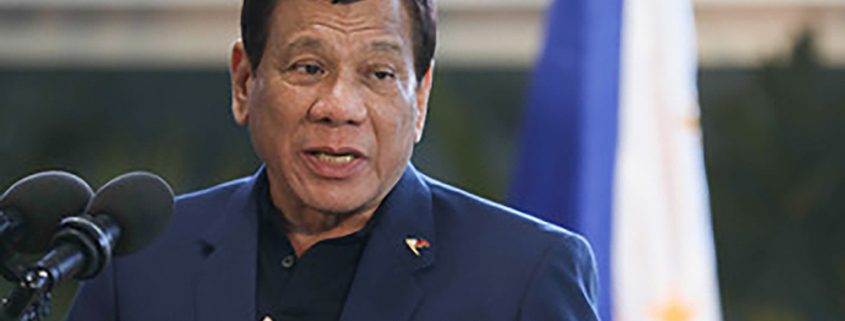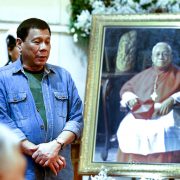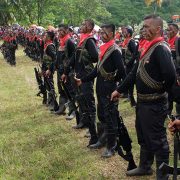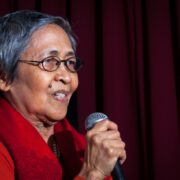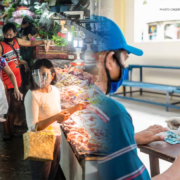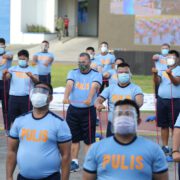Streetwise by Carol Pagaduan-Araullo: Dealing with Duterte
We have been getting “I-told-you-so” and “why-do-you-still-put-up-with-him” reactions from quite a number of well-meaning people here and abroad after President Rodrigo Roa Duterte declared martial law in Mindanao and withdrew the government negotiating panel form the 5th round of peace talks with the NDFP effectively causing its collapse.
As far as they are concerned, President Duterte and his regime are not so much as “unfolding” but more of “unravelling”. Now a quick explanation on the difference between the two as applied to the Duterte phenomenon and as it is currently being used in the Left’s parlance.
“Unfolding” essentially means Duterte can either turn more to the Left or the Right in so far as his policies and actuations depending on several key factors and developments. “Unravelling” means he is what he is – a conventional/traditional politician who has managed to reach the top of the heap and is now the CEO of the reactionary ruling system – ergo he will inevitably reveal himself as such despite his claim that he is “Leftist” and “socialist”.
The implications of whether one leans to the “unfolding” or the “unravelling” scenario is crucial because it informs one’s attitude towards the Duterte regime and how one deals with him.
After Duterte’s one year in office, it is clear that the national democratic movement in the country – ranging from the revolutionaries waging armed struggle to the political activists leading the struggle for basic reforms in the legal arena – have no illusions about the current regime.
Duterte’s rise to power has not made a dent on the semifeudal, semicolonial character of Philippine. The local oligarchy of big landlords, big comprador and bureaucrat capitalists still lord it over society, tightly controlling the levers of power. The country’s former colonizer, the US of A, still dominates and interferes in all spheres of national life – economic, political and cultural. This despite Duterte’s rant spiced with curses against the US and the oligarchy in general (and some specific ones he just can’t abide), and grand promises of socio-economic reforms to benefit the people.
All the statements coming from the Left of the political spectrum on Duterte’s first year are highly critical and on many policies and programs, even denunciatory – martial law; the Marawi siege; the so-called war on drugs; the counterinsurgency program against the CPP-NPA-NDFP; political repression of peasants, workers and urban poor fighting for their rights; the continuation of anti-people/pro-elite and anti-national/pro-foreign monopoly capitalist economic policies; US military presence and involvement in internal armed conflicts; persistence of corruption, bad governance, patronage politics and impunity for grievous human rights violations.
But still the Left is giving Duterte some benefit of the doubt mainly because of two major policy changes – the resumption of peace talks with the CPP-NPA-NDFP and the appointment of their nominees in three Cabinet positions. This is what is being referred to as significant and concrete evidence of the “unfolding”.
To some this would appear to be self-serving but in reality, there is sound basis for giving weight to these hallmark decisions of President Duterte. If the peace negotiations are to be pursued by both sides in earnest in order to address the underlying roots of armed conflict and thereby arrive at a negotiated settlement on the basis of fundamental socio-economic and political reforms, then we are looking at the dawning of the just and lasting peace our people have been longing for.
In the same vein, the appointment of outstanding and competent leaders from the Left in the Duterte Cabinet is an unprecedented move that is in tandem with his peace initiative. It is a grand confidence-building measure that gives credence to his idea of “inclusivity” in his government. Moreover, given the integrity, commitment and hard work the three Cabinet officials have consistently demonstrated in the last year – they are a boost to the Duterte regime in more ways than one.
Too bad the GRP-NDFP peace talks have been subjected to a lot of delays and now, a major impasse, because of the countervailing pressure of the right-wingers – pro-US militarists and rabid anti-communists – whose idea of the peace negotiations is providing a graceful exit for the surrender and cooptation of the revolutionary movement but without conceding any significant socio-economic and political reforms.
This has translated into the insistence on putting the cart before the horse; that is, getting the NDFP to agree to an interim, bilateral, open-ended ceasefire ahead of inking the Comprehensive Agreement on Socio-economic Reforms (CASER) and the Comprehensive Agreement on Political and Constitutional Reforms (CAPCR).
The GRP insists that a bilateral ceasefire complete with terms of reference as to buffer zones, what constitute violations, third party monitoring, etc makes for an “enabling environment” for the peace talks. This goes along with the notion propagated in the mass media by the GRP and so-called peace advocates that ceasefires are sine qua non to peace negotiations between two warring parties.
The NDFP for its part will only enter into a bilateral ceasefire, even an interim one preceding a Comprehensive Agreement on End of Hostilities and Disposition of Forces (CAEHDF), when the CASER is signed and all political prisoners are released in accord with the Comprehensive Agreement on Respect for Human Rights and International Humanitarian Law (CARHRIHL).
The NDFP sees a premature bilateral ceasefire as anathema to the objective of achieving a just peace. They anticipate that the GRP will lose all interest in negotiating, much less implementing, CASER and CAPCR once it gets a bilateral ceasefire. The revolutionary forces are admittedly on the strategic defensive because of the huge disparity between the strength of the Armed Forces of the Philippines versus the New People’s Army. A bilateral ceasefire would put it on the tactical defensive as well, tying the NPA’s hands in terms of defending territory under its shadow governance and protecting the gains of its revolutionary programs in the countryside.
The CPP-NPA-NDFP knows from experience that the GRP will not cease its counterinsurgency operations that wreak havoc on peasant and indigenous peoples’ communities even when short-term, unilateral simultaneous ceasefires are in place as in the 5-month period spanning the resumption up till the third round of peace talks.
Too bad as well that the confirmation of the progressive Cabinet officials, Agrarian Reform Secretary Rafael “Ka Paeng” Mariano and Social Work Secretary Judy Taguiwalo, hang in the balance certainly not because of any charges of corruption, incompetence or partiality but because Duterte’s enlightened policy in dealing with the Left is steadily being undermined as he swings to the Right.
Meanwhile, the Left as a whole is not passively watching Duterte and events unfold. The task of exposing and opposing the anti-people policies of his regime is firmly being carried out. All forms of struggle – armed and unarmed – are being pursued in order to defend and uphold the people’s rights and welfare. Through the peace talks, the progressives in the Duterte Cabinet and most especially the democratic movement of peasants, workers, urban poor and the middle forces in society, the Left continues to engage – unite and struggle as the case may be – the Duterte regime.
It is a complex, difficult and often dangerous approach but must be done if the Left is to seize and maximize all openings for pushing truly meaningful change in this country, with or without Rodrigo Roa Duterte. # (First published in Business World, 3 July 2017)

